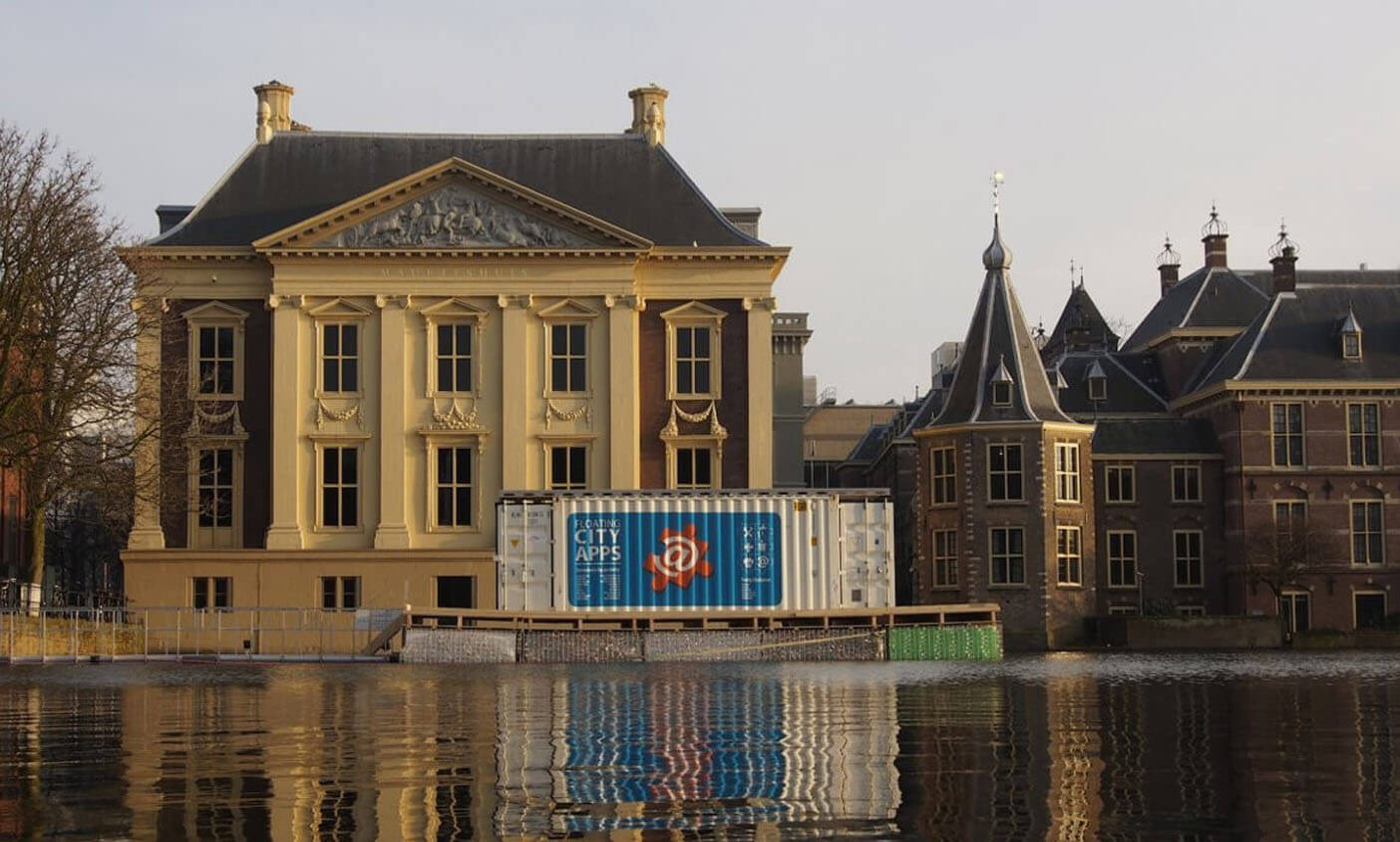
Final test for Floating City App before it is shipped to Bangladesh
The First Floating City App underwent its final test. The app successfully floated on a platform created of thousands of PET bottles. Test location: The Hofvijver, the pond next to the Dutch Parliament, The Hague. The inaugural ceremony witnessed official handing over of the app by the honorable representative of The Hague Municipality Mr. Karsten Klein, to the honorable Ambassador of Bangladesh Mr. Sheikh Mohammed Belal. The app is being shipped to Dhaka, Bangladesh to be utilized for education and communication purposes in wetslum of Korail.
Floating City Apps
The dynamic nature of adjusting apps in our smartphone is envisioned in the functionality of City Apps, which can adjust to the ever changing scenario of slum. City Apps are floating developments based on a standard sea-freight container. These apps can be established in water-bodies of slum, where there is scarcity of space. Due to their flexible characteristic and limited space consumption, they are ideal for upgrading sanitation, housing and communication installations. Floating City Apps have the ability to influence morphology of new slums. This makes Floating City Apps a development planning tool for municipalities.
Communication App
The first City App is designed as a Communication App, housing 20 tablets and 2 TV screens, it will serve as a social and educational platform which connects slum inhabitants to the internet. The app has the capability of providing a multi-faceted platform ranging from business & entrepreneurial venture, communication hub, education of children to digital market place for craftwork, women’s education & empowerment and health education. The interior of the app has built-in wall unit that encompasses the digital equipment, which allows for maximum space.
Nowadays modern technologies are indispensable. Majority of population in developing nations have access to long distance communication, thanks to mobile phone. For instance in wetslums, people benefit from their phone for diverse purposes. Yet, there is an extreme shortage of internet connection. Internet is immensely expensive for slum inhabitants. For example, people earn about $1.50 per day in wetslums, a subscription for mobile internet costs $12,- per month or, in the internet café $0.50 per hour.
Construction of the Floating Foundation.
An ultimate goal of ours was to develop floating foundation construction, created through easily accessible materials in wetslum. Purchasing PET bottles for the foundation of the App provides an incentive for slum inhabitants to help clean the environment and also provides a platform for slum inhabitants to involve in the development of a floating city app. The foundations are made of steel gabions filled with PET bottles. A wooden deck is placed on top of the gabions, to create a rigid flaoting element which can hold the container in place.
Research on Wet Slums
One billion people worldwide live in urban slums; most of them close to open water. Being most vulnerable to floods, these areas are the least attractive for local upgrading investments. Using a bottom-up approach, we aim to upgrade Wet Slums with small-scale (instant) solutions. Comparable to adjusting your smart phone with apps according to your changing needs you can also adjust the functionality in a slum by adding functions with Floating City Apps.
To succeed in our goal to upgrade wetslums, a solid network of building support and trust is required. We work with the proven efficiency of the network of IHE UNESCO which has hydraulic engineers all over the world. These local advisors open the road to lasting partnerships with local NGO’s, Universities embassies and local politicians.
Working method
Initial stage involves mapping of slum alongside determination of potential water related constraints. With the help of our network, licenses and local manager or entrepreneur, the Floating City App with the most impact or effect is selected. The Floating City App is then transported from The Netherlands to the slum. The floating foundation is built at location from used PET bottles and supported by a frame as described earlier. A business model is prepared, for paid use of the Floating City App. This is executed in order to get a ROI for the investors. In case of any change in situation the City App can be reused, relocated and / or sent back to The Netherlands. It remains in its value.